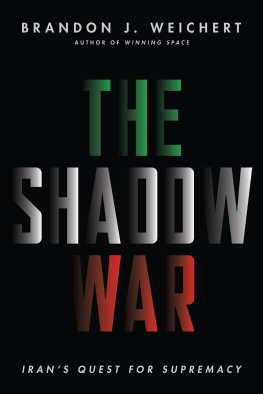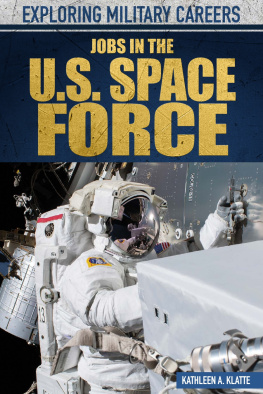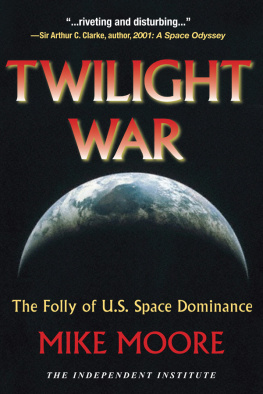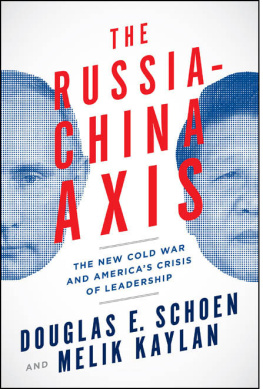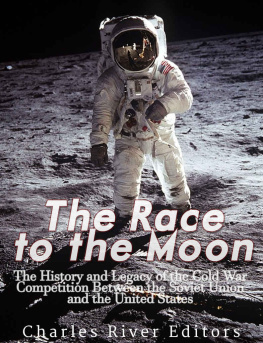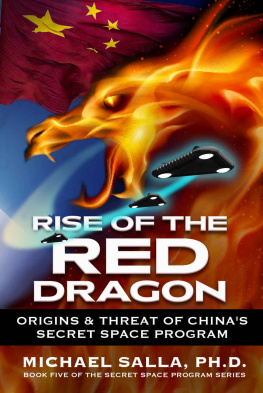

Copyright 2020
Winning Space
FIRST EDITION
Copyright 2020 Brandon J. Weichert
All rights reserved. No part of this book may be reproduced in any form or by any electronic or mechanical means, including information storage and retrieval systems, without permission in writing from the publisher, except by a reviewer, who may quote brief passages in a review.
All information included in this book is based on the Authors recollections, opinions, and views. Publisher makes no representations, warranties, guarantees or otherwise with respect to the accuracy or completeness of the contents of this book.
ISBN 9781645720119 (Hardcover) 9781645720126 (ebook)
For inquiries about volume orders, please contact:
Republic Book Publishers
501 Slaters Lane #206
Alexandria VA 22314
Published in the United States by Republic Book Publishers
Distributed by Independent Publishers Group
www.ipgbook.com
Book designed by Mark Karis
Printed in the United States of America
For Ashley, Charlotte, and Madisonmy three loves. To God, for giving me the passion to do this. To my parents, who have always supported me in my endeavors (including this one). To my IWP family for giving me the tools to succeed. And to Frank and Esther for letting me stay at their beautiful home for all of my lectures in Washington, D.C. over the years.
Thank you for everything.
CONTENTS
FOREWORD
MACKUBIN THOMAS OWENS
BRANDON WEICHERT has written a lively and informative book on the evolution of US space policy and its future. He argues that we are at a crossroads: if we continue on the path we have tread in recent decades, we could face a space Pearl Harbor or worse. Not only China and Russia but also Iran and North Korea are developing the capabilities to attack strategic US space assets.
Our use of space is pervasive, so much so that Americans dont even recognize how dependent we are on space, not only for national security but also for civilian communications and commerce, which rely at a minimum on GPS and satellite-based telecommunications. The fact is that the United States has the most to lose if space based assets are ever attacked.
From a national security standpoint, space is a strategic domain. Weichert observes that US space policy has been shaped by three schools: the sanctuary school, which fears the militarization of space and seeks to apply international cooperation and arms control measures to counter a space arms race; the survivability school, which seeks to make the United States less reliant on satellites while enhancing the survivability of existing satellite constellations to withstand attacks; and space control or space superiority, a defensive posture relies on deterrence. This is the school favored by most military officers.
Weichert lays out the shortcomings of each of the schools and argues on behalf of a more radical posture: space dominance. This approach treats space as the strategic high ground, giving the United States an advantage in its pursuit of its interests.
Although space as a strategic domain shares many characteristics of air power, it is more analogous to sea power. As the legendary John Collins observed in a chapter of his watershed book, Military Geography, space can be divided into four regions: Earth and its atmosphere; circumterrestrial space; the Moon and its environs; and the outer envelope. Here we can find analogs to choke points and sea lines of communications. Controlling these features can have strategic effects. As the First Lord of the Admiralty, Admiral Sir Jackie Fisher remarked in 1904, Five keys lock up the world! Singapore. The Cape. Alexandria. Gibraltar. Dover. And England controlled them all by means of the Royal Navy.
But sea power works indirectly over time. Although Trafalgar was a decisive battle that ultimately sealed the fate of Napoleonic France, it would be ten more years before Napoleon was finally defeated. As Alfred Thayer Mahan wrote in The Influence of Sea Power upon the French Revolution and Empire, 17931812, Those far distant, storm-beaten ships, upon which the Grand Army never looked, stood between it and the dominion of the world. In contrast, space power can have an immediate strategic impact.
A problem that transcends a philosophy of space is that the assets necessary to ensure space dominance must compete against other claimants of limited resources. And space planning to counter something like a space Pearl Harbor is an example of what Frank Hoffman calls a pink flamingo: a predictable event that is ignored due to cognitive biases of a senior leader or a group of leaders trapped by powerful institutional forces. These are the cases which are known knowns, often brightly lit, but remaining studiously ignored by policymakers.
In this book, Weichert sounds a clarion call for taking space dominance seriously. Whether one agrees with him or not, his argument is one with which national security experts must contend.
INTRODUCTION
MAKE SPACE GREAT AGAIN
IN 2013 , as a young congressional staffer working for a Tea Party Republicana real Mr. Smith Goes to WashingtonI was asked to attend a meeting on his behalf in my first week. It was a seemingly innocuous meeting where a group of space advocates gave a rundown on some of the critical issues regarding satellite management. During that meeting, though, someone raised the point that the satellites the US military relied on were getting old and that they were increasingly hard to maintain because of their age. Some of the space policy people cautioned that these aging satellite systems were susceptible to attack from rival states.
In fact, another added, Americas enemies were actively developing counterspace weaponssystems that could be used to deny the United States military access to the strategic domain of space in the event of a crisis. Satellites are important because they provide bandwidth to a modern society such as ours. Without that bandwidth everything would grind to a halt. The most amazing part of the meeting, at least to me, was the ambivalent reaction from most of the lawmakers, Republican and Democrats alike. Some of them did take note of what was said. Ultimately, however, nothing came of it. After all, space was too expensive. Better to let that sleeping dog lie. And the longer we refused to allow the space dog to hunt, the more numerous the prey in the field became. The prey even started evolving into predators themselves.
That meeting stuck with me for the next several years. I soon found myself enrolled in a masters program at the Institute of World Politics in Washington, DC. At that school, all of the students were challenged on a routine basis to think as unconventionally as possible. Most of the students were mid-career civil servants from the executive and legislative branch. I was one of the youngest students there. Ultimately, I found several professors who encouraged me to pursue my own research interests. Given that I was so interested in space policy, professors there, like Dr. John Lenczowski, the founder of IWP, as well as my adviser, John Tsagronis, and Dr. Marek Chodakiewicz, all compelled me to continue expanding my research in this critical issue that no one was talking about at that time. Finally, Dr. Mackubin Owens gave me the added push I needed to keep up my research, even when all seemed lost (being mocked as a space cadet would grow tiresome over the years).
Next page

